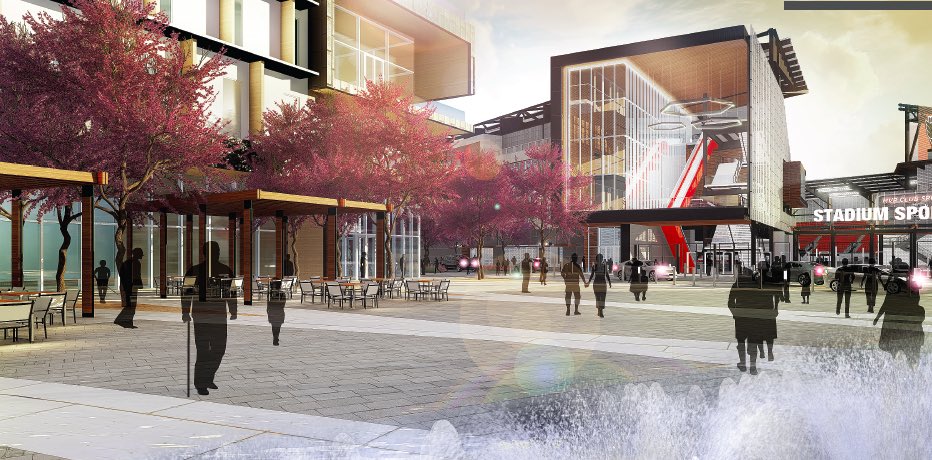The D.C. United and a group of developers in the Buzzard Point area are tangled in a dispute over the design of the team’s forthcoming stadium.
In a letter dated October 7, four developers and an official from the Capitol Riverfront Business Improvement District (BID) expressed their concerns to D.C. councilmember Charles Allen over how the proposed stadium will affect the surrounding area. The letter-which was signed by Matthew J. Klein of Akridge, John R. Clark III of Steuart Investment Company, Herb Miller of Western Development Corporation, Jerry Zayets of Capital City Real Estate, and Michael Stevens of Capitol Riverfront BID-contended that the stadium’s current design will hurt growth in the area’s retail sector.
Renderings recently released by the United included several plaza areas, an alleyway along First Street SW, and a few other features. With a particular focus on the plaza, the stadium’s design along First Street SW, and a proposed loading dock, the developers contended that the facility and related development will not be accessible enough to generate significant economic activity, particularly on non-gamedays. “Unless further changes to the plans are made in advance of the November 2nd Zoning Commission hearing, we will have no choice except to actively contest the zoning application and seek to have the Zoning Commission compel the team to make changes,” the letter stated.
The zoning hearing is crucial to the United, because the team’s goal is to begin construction by early 2017. Under a recently-released schedule, the stadium’s opening is not expected to take place until June 2018, which would put it a few months behind the start of the MLS season.
Obviously the United would like to prevent any further delays, and are stating that the stadium’s design should be approved as is, as the team has already addressed some previous concerns and does not think the developers’ proposals are feasible. United managing general partner Jason Levien also believes that the developers could have ulterior motives. More from the Washington Post:
Levien questioned the motivations of his opponents, saying Akridge and Miller were threatening to hold the stadium hostage in order to pressure the team into selling its retail space to them. “I would encourage you to ask Akridge why they are so interested now in this project when they’ve had that land for years and haven’t built anything,” Levien said.
Klein said the firm had done no such thing – “We have not done that” – but in an email to the team and two Akridge executives obtained by The Washington Post, Klein’s partner Miller says United “must agree” to sign the retail over before the zoning commission hearing so “we can all be on the same wavelength.” The email was sent two days after the letter to Allen.
In an interview, Miller said he was simply trying to find a way to resolve the disagreement between Levien and Akridge in a way that improved the stadium design.
“I’m just saying whatever the cost is to do those changes, the retail could [pay for] it. [Levien] is not a retail developer so we could just do it,” Miller said. “I offered him $5 million, he said it’s $7 million. So it’s $7 million. They got to get a price [to build the retail] from contractor and we’ll pay it.”
Unless the two sides can mend their relationship between now and the zoning hearing, the issue will likely persist until a ruling is made. If the Zoning Commission would find fault with the project, the question becomes what will happen to the stadium’s timeline. Previous reports indicate that the United would start the 2018 season on the road rather than return to RFK Stadium for a handful of games, but delays to the stadium could complicate that plan.
Rendering courtesy D.C. United
This article first appeared in the weekly Soccer Stadium Digest newsletter. Are you a subscriber?Sign up here for your free subscription!

